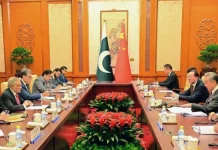DM Monitoring
Washington: As the United States searches for a way back to the 2015 Iran nuclear deal, it tiptoes through a minefield established by former US President Donald Trump. The mines are Iran-related sanctions that Trump imposed on more than 700 entities and individuals, according to a Reuters tally of actions by the U.S. Treasury, after he abandoned the nuclear deal and reinstated all sanctions it had removed.
Among these, Trump blacklisted some two dozen institutions vital to Iran’s economy, including its central bank and the national oil company, using US laws designed to punish foreign actors for supporting terrorism or the proliferation of weapons. Removing many of those sanctions is inevitable if Iran is to export its oil, the biggest benefit it would receive from complying with the nuclear deal and controlling its atomic program. But eliminating them leaves Democratic President Joe Biden open to accusations that he is soft on terrorism, a political coup that may be inevitable if the deal is to be revived. The possibility has already drawn strong Republican criticism. “It’s immoral,” former Trump Secretary of State Mike Pompeo said last month as he promoted legislation to make it harder for Biden to lift sanctions against Iran. John Smith, director of the Treasury’s Office of Foreign Assets Control (OFAC) from 2015 to 2018, described Trump’s wave of sanctions on Iran as “unprecedented in modern American history.”
Targeting Iranian institutions for supporting terrorism or for ties to the Islamic Revolutionary Guard Corps (IRGC) has made reviving the deal much more difficult, said Smith, now a partner at the Morrison & Foerster law firm. “By adding global terrorism, IRGC or human rights abuses to any list, it is incredibly difficult politically to remove those names from the list,” he said. “You can do it, but you will face a much greater setback if you do it.” A U.S. official said the count of sanctions imposed by Trump by Reuters was close to the Biden administration’s count, though judgments about what to include may yield slightly different totals.
The reinstatement of US sanctions has ruined the Iranian economy, which contracted 6% in 2018 and 6.8% in 2019, according to data from the International Monetary Fund. Trump, a Republican, withdrew from the accord in 2018, arguing that it gave Iran excessive sanctions relief for improper nuclear restrictions, and imposed a campaign of “maximum pressure” in a failed attempt to force Tehran to accept nuclear limits. more strict. He also said the deal had failed to reduce Iran’s support for terrorism, backing from regional representatives in Syria, Iraq and Lebanon, and the search for ballistic missiles. Biden wants to restore the nuclear limits of the pact and, if possible, extend them while rejecting what he has called Iran’s other destabilizing activities. US and Iranian officials have started indirect talks in Vienna seeking a way to resume compliance with the deal, which Iran, after waiting about a year after Trump’s withdrawal, in 2019 began to violate in retaliation.




